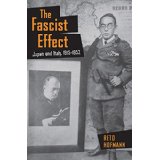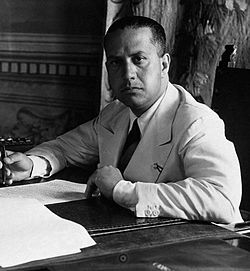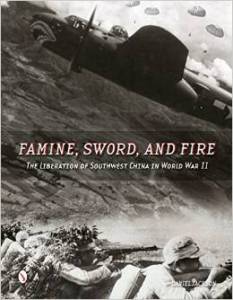Posted: August 23rd, 2015 | No Comments »
A new book Reto Hoffman’s The Fascist Effect: Japan and Italy, 1915-1952, raises some points about Italy’s involvement in China between the wars I’ve often pondered.

For a long time Mussolini opposed Japan’s claims in China as part of his policy on East Asia – this was essentially self-serving rather than anything to do with the illegality of Japan’s occupation of Manchuria. This was also because, in no small part, Italy did very well selling arms and war machinery to Chiang Kai-shek. These sales annoyed Tokyo no end who, of course, wanted to see China cut out of the international arms market and keep her armies poorly equipped. Italy had been involved in equipping China for some time – back when Count Galeazzo Ciano was Italy’s Consul in China (1930-1933) and a celebrity (and legendary skirt chaser) on the city’s social circuit with his wife Edda, Mussolini’s daughter. Ciano also built relations with Zhang Xueliang (The Young Marshal), the Manchurian warlord. However, when Japan invaded China in August 1937 the Italians switched to supporting Tokyo and the axis in the east was firmly established.

Ciano
Posted: August 23rd, 2015 | No Comments »
The latest title from the good folks at Earnshaw Books – Tales of Old Batavia – that’s Jakarta now to those of you who prefer the world post-1945…..
 The city of Jakarta, today the capital of Indonesia, has had other incarnations and other names, most notably as the regional headquarters of the Dutch East Indies when it was known around the world as Batavia. As the capital of the Netherlands’ highly unlikely empire in the far east of Asia, Batavia was for 200 years the lynchpin for the international spice trade. This book features highlights from the fascinating history of one of the most great cities of Asia.
The city of Jakarta, today the capital of Indonesia, has had other incarnations and other names, most notably as the regional headquarters of the Dutch East Indies when it was known around the world as Batavia. As the capital of the Netherlands’ highly unlikely empire in the far east of Asia, Batavia was for 200 years the lynchpin for the international spice trade. This book features highlights from the fascinating history of one of the most great cities of Asia.
Posted: August 22nd, 2015 | No Comments »
The BBC revelations that Britain failed to prosecute a member of the intelligence services, Cedric Belfrage, who passed secrets to Russia in World War Two out of fear of embarrassment, are not totally surprising but good to have confirmed. Belfrage’s turn to the left apparently took place while he was working in Hollywood in the 1930s; he then worked for Mi6 in New York. Suspicion that he had been passing secrets to the Soviets appeared in 1945. You can read the full BBC story here.
But is there a China angle to Belfrage? Certainly Belfrage was in China in 1957 where, he claimed, he was “the only person…reporting for an American publication”. Belfrage knew James Aronson, the American Leftist and co-founder of the National Guardian with Belfrage in the late 1940s and visited China to report for that publication. The National Guardian was considered generally friendly to the PRC. In 1979, Aronson was teaching journalism in Beijing – in a series of letters the two had a major disagreement about China’s presence in Vietnam that threatened their friendship (the letters are contained in the Belfrage archive in New York). Slightly earlier Belfrage had corresponded with a number of journalists and academics regarding about China’s position on Angola.
Belfrage had been deported by McCarthy from the US back to the UK in 1955 and then went to China shortly after that. By that point to all intents and purposes his spying days were over.
  Aronson, Belfrage and John McManus – the founders of the National Guardian – in New York in 1948
Aronson, Belfrage and John McManus – the founders of the National Guardian – in New York in 1948
Posted: August 21st, 2015 | No Comments »
Far from an “untold story” though China’s ruling communist Party has had little to nothing to say about the Chinese KMT armies or alliances with other countries to fight (except the Russians a bit to please Putin) in the run up to the 70th anniversary of VJ Day. So we’ll forgive the publisher hyperbole as Daniel Jackson’s Famine, Sword and Fire is a welcome and timely addition to China WW2 literature….

The untold story of Chinese and Americans standing side-by-side, fighting together and dying together on the highest, most rugged battlegrounds of World War II. In May 1942, the Japanese 15th Army conquered Burma and southwest China. Only a desperate defence by disorganised and defeated Chinese troops and the war-weary remains of Claire Chennaults mercenary Flying Tigers stopped the advance at the Salween River. For two years, the people of southwest China lived under an oppressive Japanese occupation while Generalissimo Chiang Kai-shek, President Franklin Roosevelt, General Joseph Stilwell, and Major General Claire Chennault bickered over what to do next. Finally, in May 1944, the Chinese Expeditionary Force, with American supplies and advisors, supported from above by the legendary 14th Air Force, crossed the Salween to take back what they had lost.
Posted: August 21st, 2015 | No Comments »
As tensions escalated in and around Shanghai in late 1940 the US State Department ordered children (and suggested wives) be evacuated aboard refugee ships back to America. Here then, from December 1940, are the children of George Monk, an American businessman in Shanghai, being waved off as they board a lighter in Shanghai to get them to the refugee ship moored down at Woosong (Wusung).
I think George Monk, was George B. Monk, who was in charge of the Shanghai branch of A.C. Monk & Co., a wholesaler of tobacco based in Farmville, North Carolina. Monk received the shipments of tobacco from the United States, stored them in the China warehouses and hired an office force of between ten and twelve people (including presumably Mr Clem Breen pictured below). Monk returned to the US in 1941.

Posted: August 20th, 2015 | No Comments »
Rebecca Wue’s Art Worlds looks like a must-have…..there’s a review from the Asian Review of Books here….

The growth of Shanghai in the late nineteenth century gave rise to an exciting new art world in which a flourishing market in popular art became a highly visible part of the treaty port’s commercialized culture. Art Worlds examines the relationship between the city’s visual artists and their urban audiences. Through a discussion of images ranging from fashionable painted fans to lithograph-illustrated magazines, the book explores how popular art intersected with broader cultural trends. It also investigates the multiple roles played by the modern Chinese artist as image-maker, entrepreneur, celebrity and urban sojourner. Focusing on industrially produced images, mass advertisements and other hitherto neglected sources, the book offers a new interpretation of late Qing visual culture at a watershed moment in the history of modern Chinese art. Art Worlds will be of interest to scholars of art history and to anyone with an interest in the cultural history of modern China.
Posted: August 20th, 2015 | No Comments »
A good American business success in China here – from 1929. Ryan Planes, founded by T. Claude Ryan in San Diego in 1922, built the Spirit of St Louis for Lindbergh to cross the Atlantic in in 1927. That historic flight certainly inspired early aviators and aviation pioneers in China. In 1929 Carl Crow reported in the American newspapers that China had ordered and received (for the price of US$135,000 in 1929 money) five Ryan planes for service on the Hankow-Canton passenger line run by the Wuhan Aviation Bureau. I think these planes were technically Ryan B-1 Broughams. After Lindbergh’s successful flight Ryan built about 200 Broughams in 1927 for general sale. Clearly the planes were shipped out to China and reassembled after arrival by Earl Baskey of the Mahoney Aircraft Corporation – Frank Mahoney was a partner of Ryan’s who seems to have been the power behind the business.

The planes were given great names – The Spirit of Canton, The Spirit of Chukiang etc. Several Ryan planes had arrived in China earlier, bought by another aviation start up – there’s detail of those and a picture here.

This incredible picture shows Chinese workers (labelled “coolies”) pulling one of the reassembled Ryan Brougham’s through the streets to the airfield (we can assume this was a publicity stunt as otherwise why not assemble the planes at the airfield?)
Baskey is an interesting character in this story as he ended up spending four years in China. He got his wings around 1918 (probably a WW1 pilot – the China Monthly Review listed him as a former Squadron Commander) and then flew mail planes on the St. Louis-Chicago (with a quick stop at Rantoul, Ill for gas and oil) route. In 1924 he enterprisingly bought his own plane to tour round county fairs offering rides and also became the special Aeronautical Deputy Sheriff of Sandursky County, Ohio. In China, after delivering the Ryan planes and reassembling them in Hankow and inaugurating the 700-mile route, it seems he stayed on promoting and selling American aircraft to fledgling Chinese airlines. In 1938 he was called up and flew in WW2 with the rank of Major. He died in the 1980s in Fort Myers.

Posted: August 19th, 2015 | No Comments »
This picture shows the randomness of war in Shanghai after the Japanese invasion of the Chinese portions of the city in 1937. This is early 1938 and a Chinese bomb, aimed at Japanese warships moored on the Whangpoo (Huangpu) River has missed its target and landed in Pootung (Pudong) hitting a British-owned wharf and go-down. Judging by the smoke from the explosion I think we can assume not much was left of the facility…











